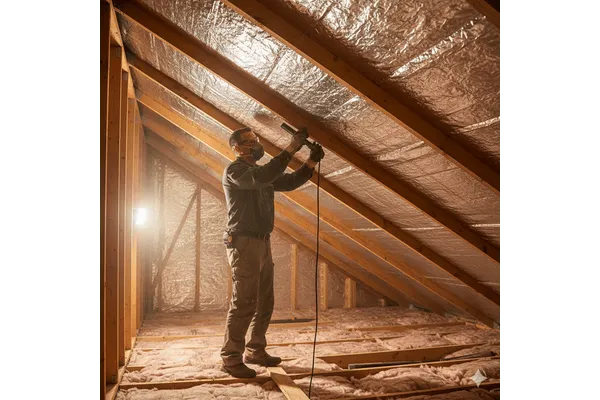
Radiant Barrier Attic Insulation: The Smart Way to Keep Your Home Cool
Summer heat can turn your home into an oven, raising energy bills, straining HVAC systems, and making living spaces uncomfortable. Traditional insulation slows down heat transfer, but radiant barrier attic insulation takes it a step further by reflecting radiant heat before it penetrates your home.
At BCP Inc., we specialize in high-quality radiant barrier solutions that enhance comfort, save energy, and protect your home. This guide will explain how radiant barrier attic insulation works, its benefits, and installation tips to maximize efficiency.
What Is Radiant Barrier Attic Insulation?
Radiant barrier attic insulation is a reflective material, typically aluminum foil, installed in your attic to reflect heat away from the home. Unlike traditional insulation that slows heat transfer, radiant barriers bounce heat back toward the roof, keeping your attic cooler.
Key Functions:
Reduces attic heat gain by up to 30°F
Lowers indoor temperatures and cooling costs
Protects HVAC systems from overworking
Complements traditional insulation for optimal energy efficiency

How Radiant Barrier Attic Insulation Works
Heat enters your home through conduction, convection, and radiation. While traditional insulation slows conduction and convection, radiant heat from the sun still penetrates.
Radiant barrier insulation works by:
Reflecting solar radiation back toward the roof
Maintaining an air gap for optimal reflectivity
Reducing the attic floor temperature and cooling load on living spaces
Tip: Proper attic ventilation enhances the effectiveness of radiant barriers, ensuring maximum energy savings.
Benefits of Radiant Barrier Attic Insulation
1. Lower Energy Bills
By reducing attic heat, radiant barriers decrease AC energy consumption, saving homeowners money on utility bills.
2. Improved Indoor Comfort
Keep your home cool during scorching summers and maintain consistent temperatures throughout the living space.
3. Extended HVAC Lifespan
Less stress on heating and cooling systems reduces wear and tear, increasing equipment longevity.
4. Protect Your Roof
High attic temperatures can warp shingles and degrade roofing materials. Radiant barriers help prolong roof lifespan.
5. Eco-Friendly
Lower energy usage equals a smaller carbon footprint, making it an environmentally responsible choice.
Types of Radiant Barrier Attic Insulation
Foil-Faced Insulation
Combines reflective foil with traditional insulation
Installed between rafters or on attic floors
Radiant Barrier Foil Rolls
Stapled directly to attic rafters or over insulation
Flexible and cost-effective for retrofits
Spray-On Reflective Coatings
Applied to roof decking for hard-to-reach areas
Provides uniform reflective surface
Installation Tips
Correct Placement: Attach foil to the underside of roof rafters or over attic insulation
Maintain Air Gap: Ensures maximum reflection
Seal Gaps & Tears: Prevents heat bypass
Combine With Ventilation: Use ridge and soffit vents for proper airflow
Retrofit Homes: Roll or spray-on methods minimize disruption
Pro Tip: Radiant barriers are especially effective in hot, sunny climates, but they also reduce heat loss in colder months.
Common Misconceptions
“Radiant barriers replace insulation.” False – they complement insulation.
“They only work in hot climates.” False – they help reduce heat loss in winter too.
“Any reflective material works.” Only engineered radiant barrier products provide proper reflectivity and durability.
Applications
Residential Homes: Single-family and multi-story homes
Commercial Buildings: Offices, warehouses, retail spaces
Agricultural Structures: Barns, poultry houses, greenhouses
Conclusion: Keep Your Home Cool and Energy-Efficient
Radiant barrier attic insulation is a smart, cost-effective, and eco-friendly solution to beat the heat, reduce energy bills, and protect your home. Combined with proper ventilation, it can dramatically improve comfort and efficiency.
At BCP Inc., we provide high-quality radiant barrier insulation solutions for both new construction and retrofit projects.
Email: [email protected]
Phone: 877-540-5678